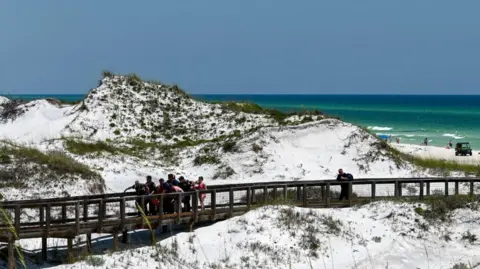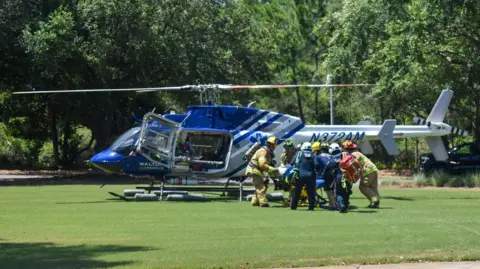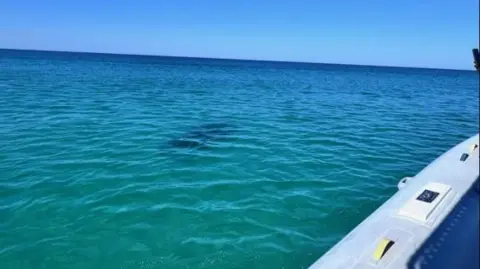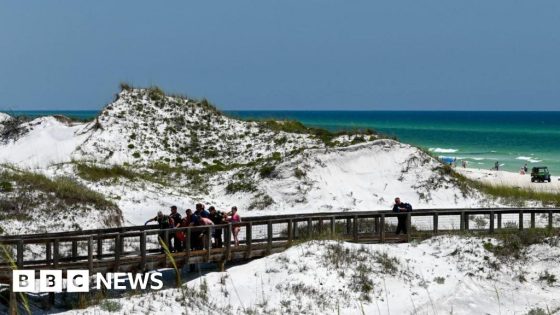By Francesca Gillett, BBC News
 South Walton Fire District
South Walton Fire DistrictBeachgoers in the Gulf Coast of Florida have been told to be vigilant, after three swimmers were attacked by sharks in two separate attacks.
One woman was said to have had part of her arm amputated after being bitten on Friday in Walton County in north-west Florida.
Less than two hours later, at another beach four miles further east, two teenage girls were in waist-deep water with friends when they were attacked.
One of the girls suffered “significant injuries to the upper leg and one hand” while the other had minor injuries on one of her feet, fire officials said.
Authorities have been patrolling the shoreline in boats and some beaches were closed, although they reopened on Saturday with purple flags warning of dangerous marine life.
The first incident happened at around 13:20 local time on Friday when a woman, about 45-years-old, was attacked near WaterSound Beach, South Walton Fire District said.
She suffered “critical injuries” to her hip and lower left arm and was airlifted to hospital, fire officials said.
Part of her arm had to be amputated, fire chief Ryan Crawford later told a news briefing, according to the BBC’s US partner CBS News.
 South Walton Fire District
South Walton Fire DistrictThe second attack – on two girls about 15 years old – happened at about 14:55 local time near Seacrest Beach, the fire department added.
“Please swim carefully, respect the Gulf, stay hydrated, and look out for your loved ones,” South Walton Fire District said on X.
Walton County Sheriff’s office said on X on Saturday that during patrols, deputies spotted a 14 ft (4.2m) hammerhead shark in Santa Rosa Beach – but stressed they were “not uncommon”.
“We want to reiterate that sharks are always present in the Gulf,” they said.
“Swimmers and beachgoers should be cautious when swimming and stay aware of their surroundings.”
According to the University of Florida’s International Shark Attack File, there are around 70 to 100 shark attacks every year worldwide, resulting in about five deaths.
The ISAF said last year, there were 69 unprovoked shark bites on humans and 22 provoked bites globally.
In Florida, the majority of shark attacks are by requiem sharks – a family of sharks that like warm seas and include species such as bull sharks or blacktip sharks.
 Walton Co Sheriff
Walton Co SheriffMost attacks occur in nearshore waters, typically near a sandbar where sharks feed and can become trapped at low tide.
Small fish are traveling in schools near the shore this time of year, which might have been a contributing factor in Friday’s attacks, the Bay County Sheriff’s Office suggested.
The time of the attacks – in the middle of the afternoon – was also an anomaly, Walton County Sheriff Michael Adkinson said, according to CBS News.
 Walton Co Sheriff
Walton Co Sheriff
Source Agencies





